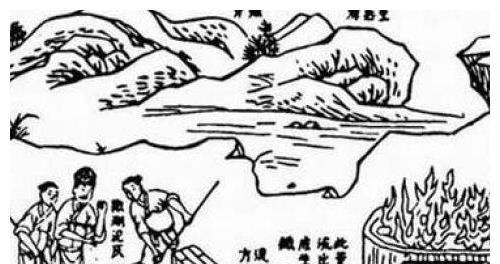Through studying ancient history, we can understand that when successive Chinese emperors strengthened the centralization of power, the right to mint coins, the right of salt and iron must be firmly grasped, and the grasp of minting rights is conducive to unifying the currency throughout the country.
Promoting economic development can also prevent private minting of currency, causing circulation difficulties, which plays an important role in social stability. Then why should the salt and iron power be so tight?

Is it because salt and iron are the weapons of the rich country, or is there any deeper mystery in addition, let's explore the things behind the salt and iron franchise that you don't know.
In fact, in ancient China, the salt and iron monopoly is another way of saying that the official camp of salt and iron can be traced back to the State of Qi in the Spring and Autumn Period, when a policy called "Guanshan Hai" was implemented.
According to legend, the Duke of Qi Huan once wanted to expand taxes to increase the country's revenue, but Guan Zhong was worried that the people would be too radical because of the increase in taxes, which would have an impact on social stability, so he asked the King of Qi to change his approach and turn tangible taxes into invisible taxes.
This also leads to the "official mountain and sea" policy. In short, by concentrating the right to use the mountains that can produce iron ore and the sea that produces salt into the hands of the central government, a large amount of benefits can be obtained from it, and there are no major side effects on social production and people's lives.
Although China's ancient farming was very stable, it was vulnerable to natural disasters and other disasters, and the interior was fragile, so salt and iron, as two pillar industries, played an important role in the development of the country, but at that time, Guan Zhong first began to implement.
It is not the state as we now understand it, but the salt ponds are handed over to the private sector for production, but the state uniformly purchases them, and the state has the final say in terms of output and price, and when these salts are sold to other countries, both the state and the merchants can obtain a large number of benefits.
Salt policy to implement monopoly, iron policy is state-owned, at that time the state monopoly mines, and formulated a strict law, once the mine is found, must be handed over to the state, and iron produced by iron ore, the state also uniformly set the price and unified acquisition.
Unified sales, from the middle to obtain huge profits, and later even if the private sector can operate freely, but also to pay a certain amount of tax to the state.
This system enabled the rapid development of the economy of the State of Qi, and had an important impact on the economic system of the later state and even modern China.
Because salt and iron are the most basic living needs of agricultural society, it is very easy to make money, and by the time of Emperor Wu of the Han Dynasty, the salt and iron monopoly was further developed, and salt was processed by the government to hire special labor, and then sold by the government.
The right to operate iron was completely monopolized by the government, and there were indeed many results at the beginning, but because some merchants specialized in holding official positions in the salt and iron monopoly, coupled with some low-quality, expensive salt and iron into the market, the people suffered a heavy blow, so it once led to chaos.
In the Eastern Han Dynasty, the salt and iron monopoly was abolished, but the tax system was implemented, and the subsequent dynasties were also crossed with monopoly and taxation, adjusted in a timely manner, but it is undeniable that the salt and iron policy made the country's profits very impressive.
Looking at the history of economic development in ancient China, which is full of wisdom, but also full of blood, tears and contradictions, from the process of change and development of salt and iron monopoly, we can probably spy the development of China's centralized system and the development of economic history.
Peering into the trajectory of China's historical evolution has had an important impact on modern times. The salt and iron monopoly in ancient Chinese history played its own role in the evolution of advantages and disadvantages, promoted the development of Chinese history, and also had an important impact on China's economic system.